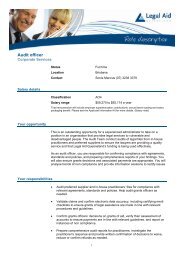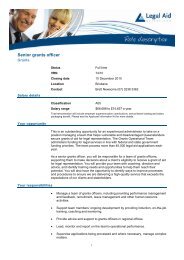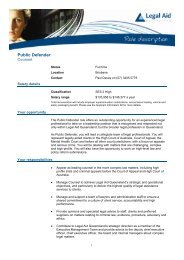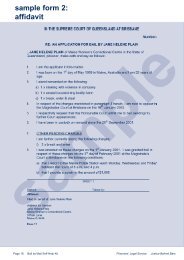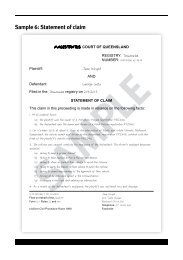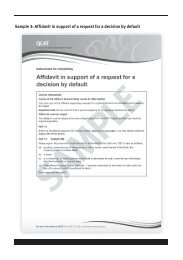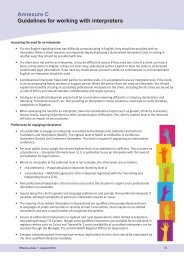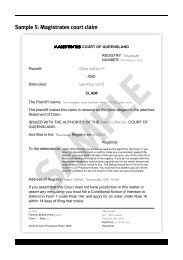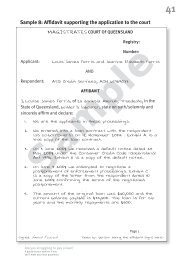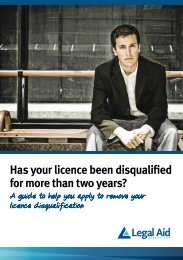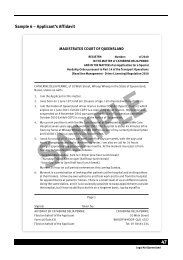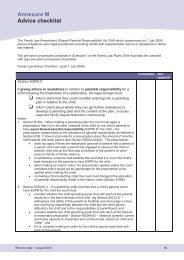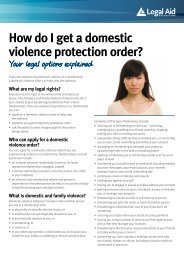Complete issue - Legal Aid Queensland - Queensland Government
Complete issue - Legal Aid Queensland - Queensland Government
Complete issue - Legal Aid Queensland - Queensland Government
- No tags were found...
You also want an ePaper? Increase the reach of your titles
YUMPU automatically turns print PDFs into web optimized ePapers that Google loves.
THE Human Rights and Equal Opportunity Commission(HREOC) new criminal record discrimination guidelinessay that when you apply for a job your criminal recordshould not be considered unless certain convictions oroffences are relevant to the inherent requirements of thejob.Unfortunately, for people like Ms Christenson whowas the 15-year-old who shoplifted two bottles of alcoholin the opening example, the guidelines aren’t legallybinding.Following on from a discussion paper <strong>issue</strong>d inDecember 2004, the HREOC launched guidelines oncriminal record discrimination on November 11, 2005called On the Record: Guidelines for the prevention ofdiscrimination in employment on the basis of criminalrecord.The ten guidelines are not legally binding, leavingpeople who have been discriminated because of theircriminal record with few actual legal comebacks.Only Tasmania and the Northern Territory prohibitdiscrimination on the basis of criminal record in a rangeof areas including employment.In Western Australia and the ACT, discrimination onthe basis of spent convictions is unlawful.For residents in the other states, complaints canbe made to the HREOC against any employer aboutdiscrimination based on criminal record.The HREOC can try to facilitate conciliation betweenthe parties involved but its powers are limited topreparing a report with recommendations to the Attorney-General for tabling in Commonwealth Parliament. Therecommendations are unable to be enforced.Ms Christenson’s case involved the rejection of herapplication to work as a bar attendant at an AdelaideCasino because she had been convicted for stealing twobottles of alcohol from a shop when she was 15.She took her case to the HREOC who found theconviction had occurred seven or eight years before herapplication, she had held other positions, and that “theconnection between the rejection of Ms Christenson’sapplication on the basis of her criminal record and theinherent requirements of trustworthiness and goodcharacter is not tight or close…”The Adelaide casino did not comply with the HREOC’srecommendations to employ Ms Christenson.<strong>Legal</strong> <strong>Aid</strong> <strong>Queensland</strong> has made submissions tothe HREOC arguing legislation needs to be introducedat both federal and state level similar to the NorthernTerritory’s legislation.We believe it should be legislated to makediscrimination on the grounds of irrelevant criminalrecord unlawful.The legislation should also compel an employer togive an employee or potential employee the opportunityto explain the circumstances of their criminal record andto argue it is not relevant to the job if the employer asksabout criminal record or requests consent for a criminalhistory check.The guidelines includeEmployers should only ask job applicants andemployees to disclose specific criminal recordinformation if they have identified that certaincriminal convictions or offences are relevant to theinherent requirements of the job.Oral and written questions made during therecruitment process should not require a jobapplicant to disclose their spent convictionsunless exemptions to spent convictions lawsapply.Criminal record checks should only be conductedwith the written consent of the job applicant orcurrent employee.Job advertisements should clearly state whethera criminal record check is a requirement of theposition.Information about a person’s criminal recordshould always be stored in a private andconfidential manner and used only for the purposefor which it is intended.To view the guidelines in full go to:www.humanrights.gov.au/human_rights/criminalrecord/on_the_record<strong>Legal</strong> <strong>Aid</strong> <strong>Queensland</strong>Anti-Discrimination UnitWhat does the Anti-Discrimination Unit do? Provides free advice to people about making acomplaint of discrimination, sexual harassment,vilification and other breaches of antidiscriminationlegislation Provides legal representation for people tocomplain of discrimination and other breachesof anti-discrimination legislation, if eligible forlegal aid Provides community legal education aboutdiscrimination and related conductHow to contact the Anti-Discrimination UnitContact <strong>Legal</strong> <strong>Aid</strong> <strong>Queensland</strong>’s call centre on1300 65 11 88 or Indigenous Hotline on 1300 650 143and book in for an advice session. Advice is usuallygiven by telephone but can be done face-to-face ifpreferred.The unit is based in Brisbane but providestelephone advice state-wide and can representclients in regional areas.If the unit is unable to take on a case and theclient is eligible for legal aid, the case will be referredto a preferred supplier. A preferred supplier is aprivate solicitor who is funded by legal aid to take onthe case.fact file>> Head Note June 200615




